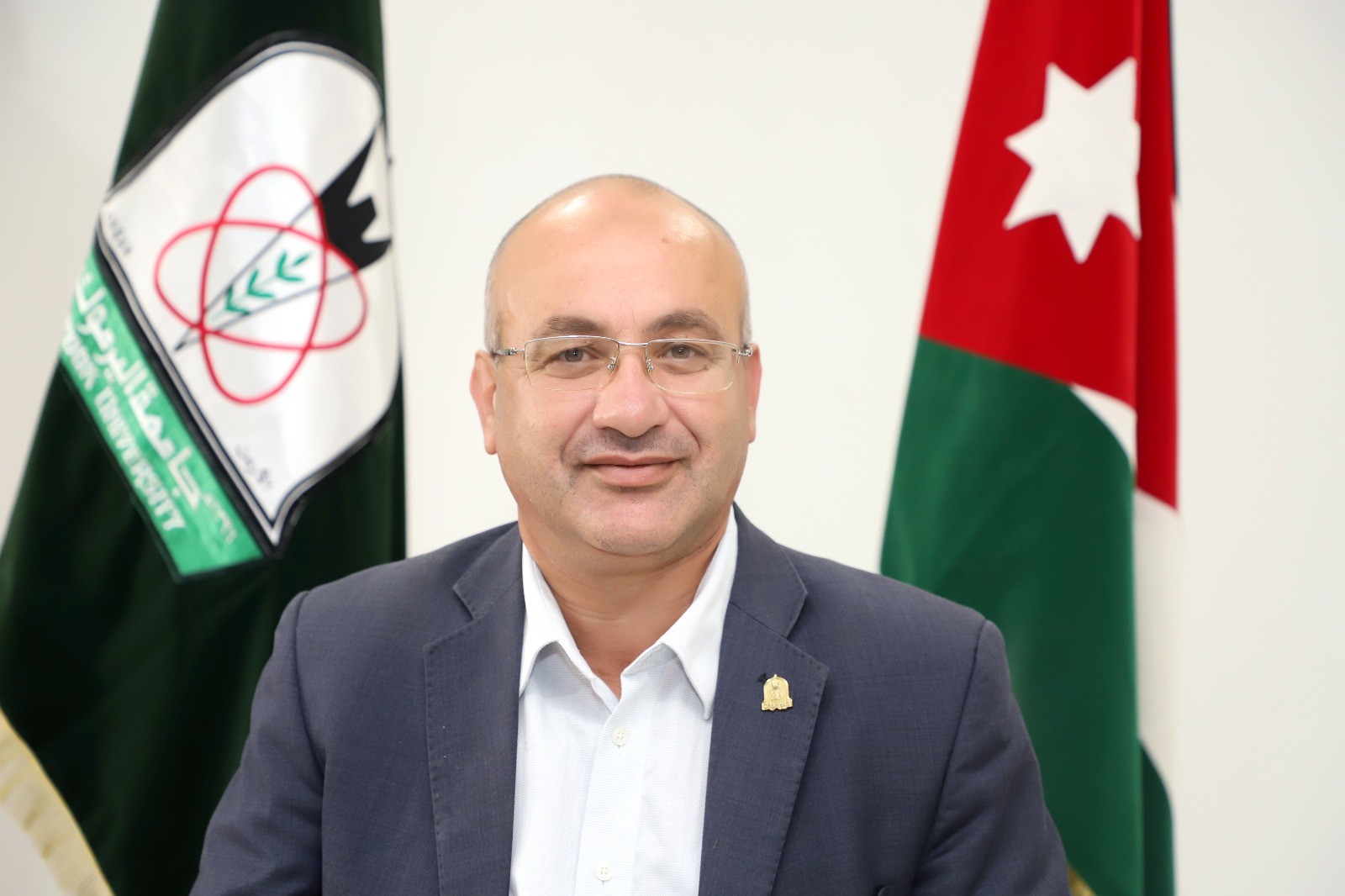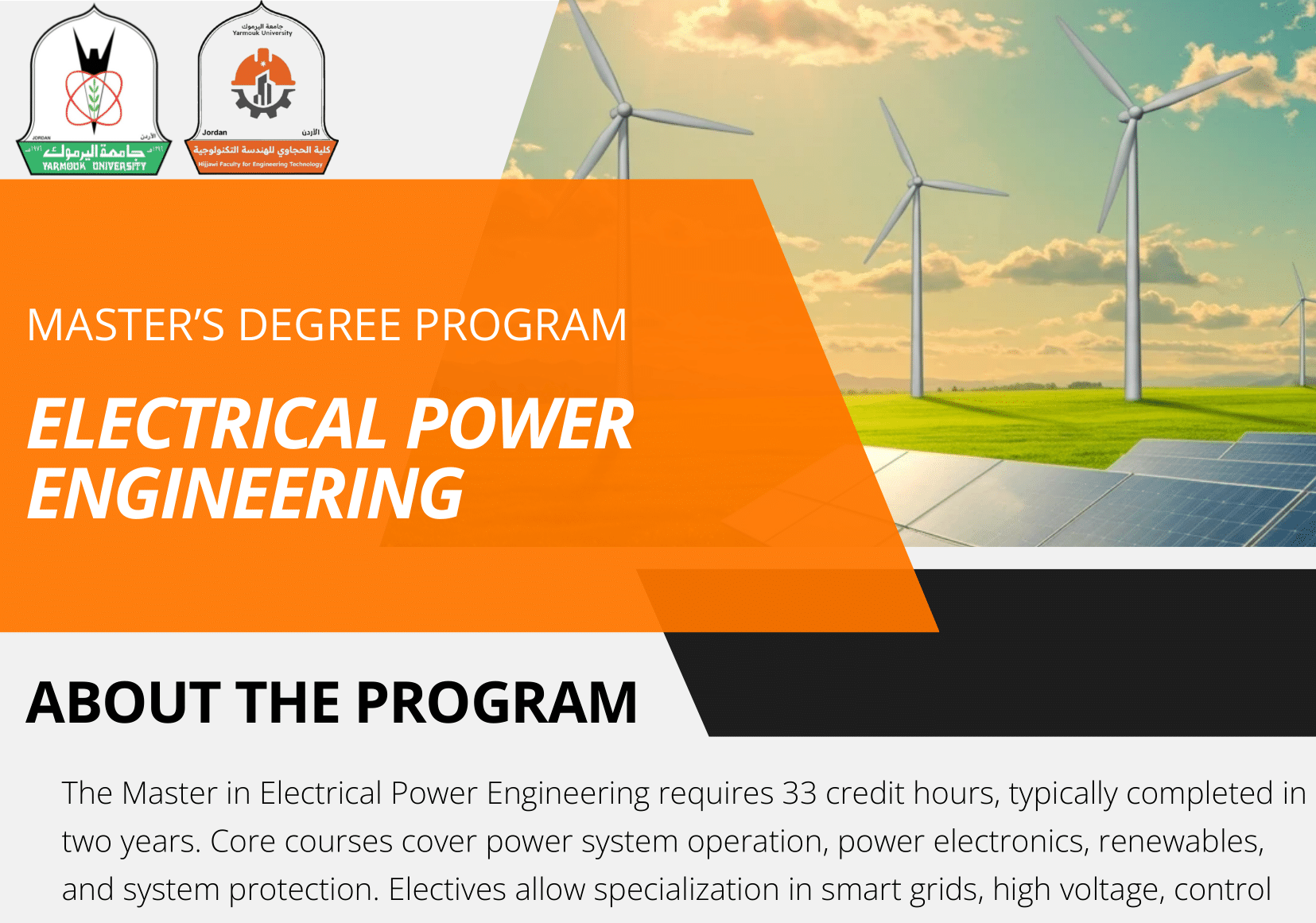Program Department and Chair
For inquiries or further information, please contact:
Email: electric.dept@yu.edu.jo
Phone: +962 2 721 1111 ext. 4239
Prof. Mohammad Al-Momani
Chair, Electrical Power Engineering Department
Professor, Electrical Power Engineering
mohammadh@yu.edu.jo
+962 2 721 1111 ext. 4239
About the Program
The Master in Electrical Power Engineering degree program at the Hijjawi Faculty for Engineering Technology, Yarmouk University, was established in 2007. It is designed to provide students with advanced knowledge and practical skills in modern electrical power systems, preparing them for impactful careers in industry, research, and academia.
The program offers two study tracks to meet different career aspirations:
-
Thesis Track: Focuses on research and innovation, ideal for students interested in pursuing a Ph.D. or engaging in academic and industrial research.
-
Non-Thesis Track: Designed for professionals seeking advanced technical expertise, with additional coursework totaling 9 credit hours.
The curriculum combines core and advanced topics such as power system analysis, electric machines, power electronics, control systems, smart grids, renewable energy systems, energy storage, and power system protection. It integrates theoretical depth with hands-on applications and often includes collaborations with the energy sector to address real-world challenges.
By blending rigorous academic training with emerging technologies, the program equips graduates with the skills and vision needed to lead innovation and drive sustainable development in the energy industry.
in the design, analysis, and operation of modern electrical power systems.
in power system simulation, control, and renewable energy integration.
through research and development in areas such as smart grids, energy storage systems, and power electronics.
by incorporating knowledge of renewable energy sources and their practical implementation in power infrastructure.
in power utilities, consultancy firms, and research institutions.
through real-world projects and industry engagement.
Study Plan
The Master in Electrical Power Engineering degree program consists of 33 credit hours and is typically completed over a period of two years. It is designed to provide students with both advanced theoretical foundations and practical expertise in modern power systems and technologies.
The curriculum includes a set of core courses that cover essential topics such as Power System Operation and Control, Power Electronics, Renewable Energy Systems and Energy Efficiency, Power System Protection, and Advanced Mathematics. These courses ensure that students develop a comprehensive understanding of the critical components of electrical power systems.
To support specialization, the program offers a variety of elective courses. Students can explore advanced areas such as Smart Grids, Power System Stability, Advanced High Voltage Engineering, Electric Drive Systems, Computational Methods in Power Systems, Power System Quality, Modern Control Theory, and Special Topics in Power Systems. This flexibility allows students to tailor their learning to match their career objectives or research interests.
The program includes two study tracks:
-
Thesis Track: Students conduct independent research under faculty supervision and defend a written thesis. This track is ideal for students aiming to pursue doctoral studies or research-intensive careers.
-
Non-Thesis Track: Students take additional coursework and must pass a comprehensive exam that assesses their integrated knowledge across the program’s subjects.
This structured blend of theoretical instruction, applied learning, and industry-relevant skills prepares graduates to meet the demands of evolving energy sectors and contribute meaningfully to innovation and sustainability in power engineering.
Tuition Fees
- For Jordanian Students
- For International Students
Career Opportunities
Graduates of the Master in Electrical Power Engineering degree program are well-prepared to pursue diverse and rewarding careers across the energy and power sectors. They possess the skills and knowledge to contribute to various industries, including power generation, renewable energy, manufacturing, regulation, consultancy, and research, driving innovation and sustainable solutions in modern electrical power systems.
-
Power Utilities (generation, transmission, distribution)
-
Renewable Energy (solar, wind, hydro, hybrid)
-
Manufacturing (transformers, generators, switchgear)
-
Regulatory and Policy Bodies
-
Consultancy Firms (smart grids, energy storage)
-
Research and Development (universities, labs, industry)
Awesome Engineering Technology Program
Learn more about the Master in Electrical Power Engineering degree program by exploring the materials provided here and discover how it equips you with advanced skills and knowledge to excel in the evolving energy and power industries.



